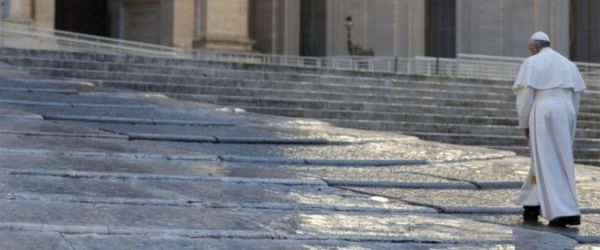Prophecy, memory and hope allow the Spirit to keep the Church alive: during his homily at the morning Mass, Pope Francis invited the faithful present to make a brief examination of conscience by asking themselves "do I have memory of the Lord's gifts? Am I capable of opening my heart to the prophets? Do I have hope in God's promises?"
It was the Gospel of the day (Mk 12:1-12) that provided the Holy Father with the cue for his reflection: commenting on the parable of the murderous vinedressers, Bergoglio illustrates how the vinedressers are an allegory of the masters of the law, that is, the scribes and Pharisees, who at the time of Jesus had built a legal system that literally enchained the Spirit, not allowing him to act freely.
It is the trap of casuistry: those whom Jesus addresses with the parable of the murderous vinedressers are the "doctors of the law, theologians who always go the way of casuistry and do not allow the freedom of the Holy Spirit". Memory does not interest them. Prophecy: the prophets had better not come. And hope? But everyone will see it".
"To these people Jesus, because he knew in himself the temptation, reproaches: 'You go halfway around the world to get a proselyte and when you find him, you make him a slave'. - commented the Bishop of Rome: 'This people so organised, this Church so organised makes slaves! And so we understand how Paul reacts when he speaks of the slavery of the law and the freedom that grace gives you. A people is free, a Church is free when it has memory, when it makes room for the prophets, when it does not lose hope'.
The parable of the murderous vinedressers therefore wants to speak to every Christian and invites us to ask ourselves whether we too are like those vinedressers there: 'Do I have memory of the wonders the Lord has done in my life? Do I remember the gifts of the Lord? Am I capable of opening my heart to the prophets, to the one who tells me 'this does not go, you must go that way; go ahead, risk it'? - Pope Francis then asked - Am I open to that or am I fearful and prefer to close myself in the cage of the law? And in the end: do I have hope in the promises of God, as did our father Abraham, who left his land without knowing where he was going, only because he hoped in God?"
"It will do us good to ask ourselves these three questions", as a brief examination of conscience, because if on the one hand the well-organised vineyard is the image of the Church, and therefore the parable is addressed to priests, on the other hand the vineyard is also the image of our soul, of each Christian, which we very often prefer to bridle and protect by erecting walls so that the Spirit cannot come and make it restless, as the soul of a Christian should be.
[Pope Francis, homily s. Marta; https://www.papafrancesco.net/non-rinchiudiamo-la-nostra-anima-nella-gabbia-della-legge/]












